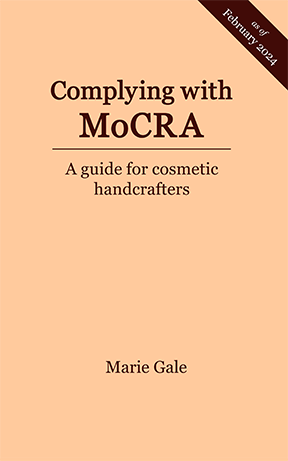The Safe Cosmetics Act of 2011 was introduced in June. I’ve reviewed the bill and have been following all the discussions. Unfortunately, it seems to have somewhat polarized the handcrafted soap community, which is surprising since we all want essentially the same things: to be able to run our businesses, to make safe soaps and cosmetics, and to not be overly regulated out of business.
Personally, my political philosophy tends toward opposing ANY additional regulation of any kind in any industry or field. However, I am also pragmatic, and realize that stopping the government from issuing new regulations is, at this point, a relatively futile endeavor.
Unfortunately, the bottom line is that sooner or later, there will be legislation that affects cosmetic regulation. It’s too much of an issue to be bypassed for very much longer, as evidenced by the attempts over the last several years. We’ve seen that each attempt builds on past tries, gradually changing the proposed legislation. Likely that process will continue until something passes.
That being the case, the best I can hope for is that that whatever regulation comes down that would/could/should affect me and my business is the least restrictive and most sensible regulation possible.
What Does this Mean to Me, as Relates to the Safe Cosmetics Act of 2011?
Do I support safe cosmetics? Yes – that’s why I started making handcrafted soap and cosmetics in the first place!
Do I want harmful ingredients or byproducts (trace or otherwise) in the cosmetics I make? Definitely no.
Do I think there ARE harmful ingredients or byproducts in some cosmetics on the market? Well, possibly. I see reports about phalates and formaldehyde and other potentially harmful ingredients. I’m not enough of a chemist or medical researcher to have a definite opinion about how harmful they may be, but I don’t want them in MY products and I would like to know if they are in cosmetics I purchase, so I can make an informed decision about purchasing them or not.
Of course, when speaking about something being “harmful,” it’s relative. Everything can be harmful in high enough quantities and conversely, everything has a level below which it is not harmful at all. Certain things, like salt and water, for example, are “harmful” (even deadly) in high volume; but on the other hand, you can’t live without them. So determining if something is “harmful” requires realistic evaluation of what the safe limits are, and working from that.
Would I like a publicly accessible source of information about potentially harmful ingredients? Yes. That would be helpful to me, both as a manufacturer and as a consumer.
Who do I think should determine the safety of cosmetic ingredients? I think the manufacturer of the ingredient should test for and know the safety of the ingredient they produce and when they sell those ingredients to suppliers they should provide that information so it can be passed on to me, so I can make an informed decision on using the ingredient or not. That safety information should also be available to the public so a consumer can make an informed decision as to what cosmetic(s) she purchases.
However, reliance on a manufacturer’s evaluation of the safety of a product they sell has been abused in the past in other industries (drugs, pesticides, food, etc.). Relying on the FDA to make the final determination hasn’t always worked, but on the other hand it’s the only alternative available. I don’t have a better idea.
Should I have to test the products I manufacture for ingredient safety? No, provided I have the ingredient information from the supplier and am using ingredients that have been determined to be safe.
Should cosmetic companies have to register with the FDA? It goes against my “less restrictive regulations” political stance, but I can see how turning the voluntary registration program into mandatory registration is likely to be the way the wind is blowing. It would provide funds to the FDA.
Should small (micro) businesses be exempt from registration? Definitely, yes. Micro-businesses have a minuscule impact on the on the total quantity of cosmetic products on the market and generally use existing ingredients (they rarely, if ever, “invent” ingredients).
Should cosmetic manufacturers have to register their products and their ingredients with the FDA? Again, it goes against my “less restrictive regulations” political stance. However, I can see that it might be a way for the FDA to get the information about what ingredients are actually in use so they can realistically set priorities for determining what’s “safe.”
Should small (micro) businesses be exempt from reporting every product and ingredient? Definitely, yes. Again, micro-businesses generally use existing ingredients and therefore wouldn’t be a source of any additional information on ingredients in use.
Should the use of “flavor” and “fragrance” as ingredients be eliminated (with all components needing to be listed)? The jury is still out for me on this one. I have no real information, but I expect there may be many, many ingredients in one fragrance, and I do feel that a company that develops a product (fragrance or otherwise) should be able to protect the formulation. However, if there IS something in a fragrance that is potentially harmful, in general I think consumers have a right to know. I’d also like to know so I can make informed decisions about what I put in my products. On the other hand, I like the ease of being able to say “fragrance” in the ingredient declaration. It is SO much easier than listing all the components.
Maybe there’s a middle ground that can be reached that will still inform and protect cosmetic consumers, inform cosmetic manufacturers, and still allow fragrance manufacturers to keep their proprietary information.
Do I support existing cosmetic labeling regulations? Yes, I do. I think it’s important that consumers are able to see what’s in a cosmetic so they can make an informed decision about whether to buy or use it.
What about identifying “contaminants?” Unfortunately, that word has several definitions, depending on how it’s used. There’s a big difference between an innocuous “contaminant” (like minerals in water), a harmful “contaminant” that is in or created within a cosmetic, or a naturally occurring component in a botanical.
As far as I’m concerned, innocuous contaminants shouldn’t need to be addressed through legislation. Naturally occurring components in a botanical are what they are, and also shouldn’t be addressed through legislation. However, I know the EU does have restrictions on some naturally occurring botanical components and it’s not unlikely that similar restrictions will occur in the US.
As for actually harmful components (either added as ingredients or as a by-product of the reaction between ingredients) that end up “contaminating” a product? Yes, I do think those should be identified, although the level at which they are considered “harmful” should be clearly identified as well. As noted above, everything is harmful at some level and nearly everything has “tolerable limits.”
The Future
I don’t know if the Safe Cosmetics Act of 2011 is going to pass. In this legislative environment, with all the other things going on in Congress, it’s anyone’s guess. It’s a long road from where it is now to getting passed and implemented and the regulations amended.
So far, as mentioned above, this bill is better than the last one. If it moves forward, I hope to see it made even better through the legislative process. If it dies at some point, then I hope all the progress will be moved into whatever comes next.
I want to be (and plan to be) involved in the legislative process.

Shameless plug!
To find out how MoCRA applies to you, what you need to do, and when you need to do it by, get my book from Amazon and use it.
Up to date as of May 2024.


Leave a Reply